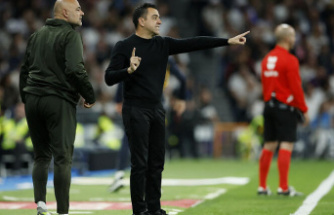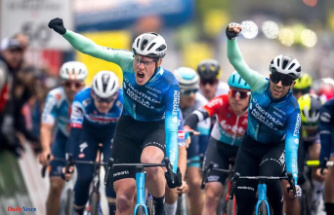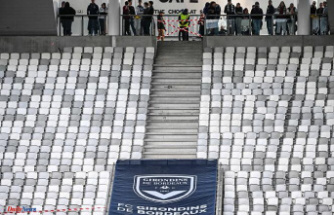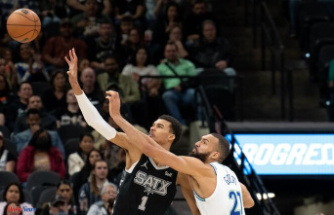The start of the season in the 2nd district class in Hildesheim ends for the referee in the hospital. Because he sends a player off. In the strange interim period after Corona and before Corona, amateur football has also become more brutal. The DFB initiates countermeasures.
What a brutal attack on a referee. A game in district class 2 in the district of Hildesheim ended last weekend for a referee in the hospital. He was struck down by a guest player in the game SG Bettmar/Dinklar against Concordia Hildesheim II. Not an isolated case in amateur football. Especially after the pandemic. "The quality of violence on the sports fields has changed after Corona," says Thaya Vester, criminologist at the University of Tübingen in an interview with ntv.de.
What happened in the district of Hildesheim? And how does that fit into what is happening on the pitches in German football? Geoffrey May is well over 30 when he decides to become a referee. His daughter swapped handball for soccer. She plays for a local club. Her father stands on the sidelines and complains about the referee. That's not enough for him. He doesn't just want to criticize and starts training referees. Digital because it's a pandemic right now. But at some point he passes the test and football is back. May, who has never played football at the club, starts his career.
"I'm a passionate referee," says May in an interview with ntv.de. "I'll whistle everything that comes up." In the best sense of the word, he is someone who fills out the honorary office. He is on the courts at the weekends, currently assisting in the seniors' division in the district league and refereing games up to district class 2. May will never referee a game in a large stadium, but will ensure that games can run smoothly in the lower classes.
So also this Sunday at the SG Bettmar/Dinklar. They expect the second team from Concordia Hildesheim at the start of the championship. May will direct the game. And keep admonishing the players. "There were minor fouls, minor gripes, nothing out of the ordinary," he says. One player from the visiting team stands out in particular. May admonishes him, warns him, then suggests a substitution. But the player doesn't respond.
"At some point I had to draw yellow-red. He first wanted to give me a headbutt, which I was able to fend off, but then I only felt a sharp pain," says May. "I then fell to the ground at some point. An ambulance was called called, the police too." The game is canceled.
The Hildesheim Police Inspectorate soberly explained to ntv.de: "The referee was struck down by the player with his fist after a verbal dispute after a yellow-red card." The perpetrator is now being investigated for assault.
"It's a very typical picture. Players who are punished personally escalate. We see it again and again," says criminologist Thaya Vester, who was a member of the "Against Violence Against Referees" project group until the last DFB Bundestag who researches incidents of violence in amateur football. At first glance, there aren't that many of them.
Only in about 0.5 percent of all games do the referees later note what are known as disruptions on the online game report sheet. "Violent acts" such as assaults or threats as well as "discrimination" are recorded there. This includes statements that violate the dignity of the person concerned, inhuman gestures and discriminatory actions. Unobjective statements and normal insults are not included. But not everything is reported, not every game is recorded online. But basically, says Vester, the incidents have remained constant in recent years.
The DFB has not yet presented any data for the most recent season. "We don't have any final figures yet, but it is becoming apparent that the number of abandoned games has increased massively." It has reached a new level. Around 0.05 percent of all recorded games are abandoned. With more than a million games in the DFB per season, a lot comes together there. The number of game abandonments for the 2021/2022 season will probably just not be in the four-digit range.
Vester cannot say exactly why the violence has increased so much. She doesn't want to speculate. However, it also speaks of a possible "brutalization" of the games after Corona. She draws on the numerous crises, large and small, of this strange interim period for this new brutality. Maybe that could be the trigger.
May has to experience this brutality on her own body. The examinations in the hospital show a nasal wall fracture, his left eye is swollen and painful when opened. May, who works as a photographer for a local newspaper, hopes there is no permanent damage to the eye. So far it looks like it. The player hasn't apologized to him yet. "I don't want that at all. Anyone who is so brutal and hits someone on the football field has no business there," he says.
Meanwhile, the DFB is trying to control the situation. Since 2019 there have been contact points for victims of discrimination and violence in all state associations. Recently there is a pilot project: de-escalation training for referees. The first reactions are very good, it can be heard.
Geoffrey May will return to the pitch. The perpetrator faces charges. His club kicked him out. The district's referee chairman says in the "Hildesheimer Allgemeine Zeitung": "In my 30 years as a referee and chairman, I have never experienced such brutality with these consequences."












